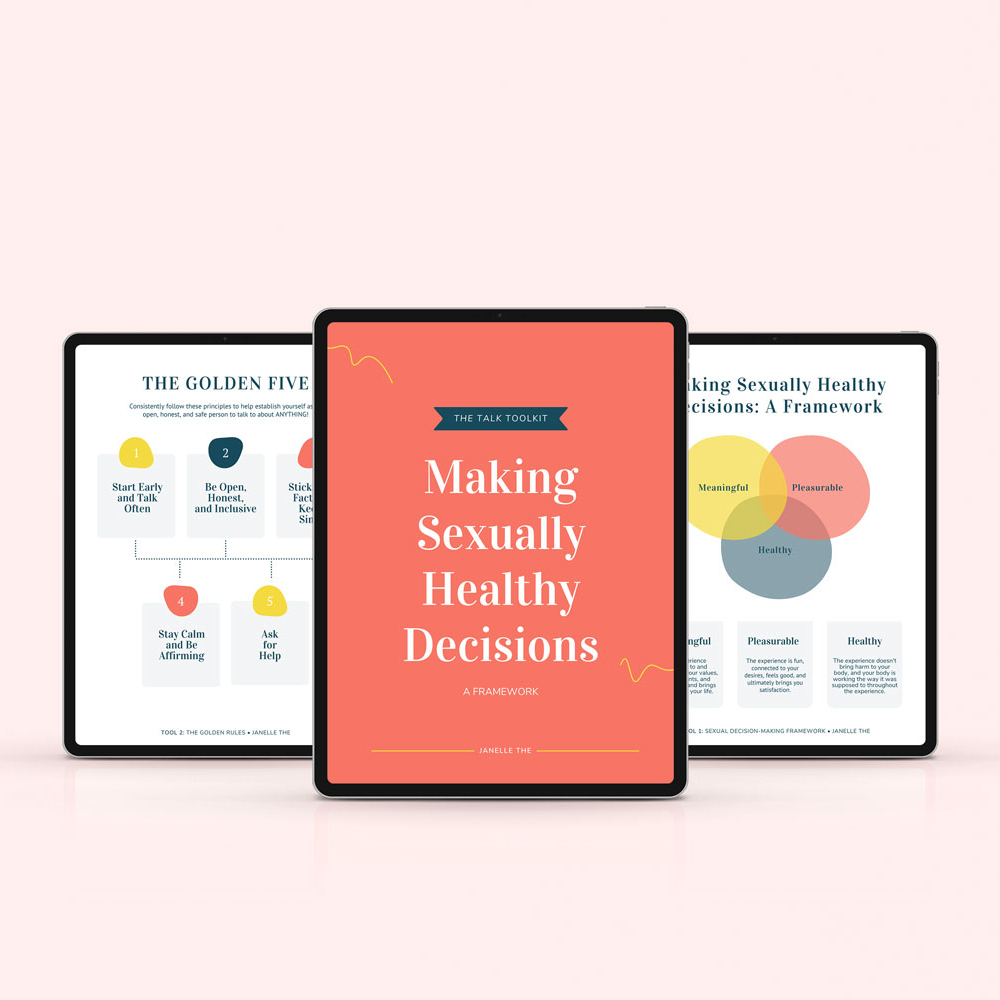Raise your hand if you want to talk to your kids about sex better than your parents talked to you about it???
Hmmm….yes, please! Don’t get me wrong, my parents are amazing, and in most areas of parenting I am quick to use their example as a guide. Without a doubt, they are my North Star for all things parenting. But when it comes to talking to my kids about sex, this isn’t really possible.
For both my husband and me, sex and sexual health definitely wasn’t a topic discussed in our homes growing up. So now that we’re parents, we’re left on our own to figure out how exactly we should navigate giving the talk, with the hope of doing things better than our parents did. (P.S. We don’t blame our parents at all. They were doing the best they could and I think it’s safe to say that our grandparents talked even less about sex while our parents were growing up.)

Here are five ways to talk about sex with our kids that are drastically different than our childhoods.
Now I’m not going to act like I have it all figured out (I don’t). But after teaching sex ed for a decade, there are five specific strategies we’re focusing on in our home as we reimagine how to give the talk and work to raise sexually healthy children.
Here are five key ways we’re talking about sex differently in our home (along with a quick comparison to the messages we heard growing up.)
#1: Sexual health is about soooooooo much more than having sex.
From Our Childhoods – Growing up the idea of being sexually healthy revolved around whether or not a person was engaging in vaginal intercourse. The message was basically, if you aren’t having vaginal intercourse outside of marriage, you’re good!
A Reimagined Approach – Well, we all know from experience that sexual health is incredibly complex. So when it comes to raising sexually healthy children, it all starts by teaching our kids that sexual health is holistic and multifaceted and that being sexually healthy is about so much more than having “good sex.” Essentially, the goal is to raise our kids to know (and give them the knowledge/tools to strengthen each area) that sexual health refers to enjoying and embracing your sexuality throughout your life by…
- Building confidence in your body, identity, feelings, and emotions
- Nurturing enriching relationships
- Exercising autonomy over your body and sexuality
- Understanding how your body works and ensuring that it’s operating at an optimal level
- All so you can engage in meaningful, pleasurable, and healthy sexual experiences.
#2: The Talk isn’t a single conversation about reproduction. The Talk is a lifelong dialogue about making enriching decisions.
From Our Childhoods – For many of us learning about sex consisted of this one or two conversations (a.k.a. The Talk) about where babies come from, periods, and maybe how not to get pregnant.
A Reimagined Approach – Raising sexually healthy children calls for nuanced conversations, rather than a talk or two about waiting to have sex and using protection. From my perspective, the goal of raising sexually healthy children is to help them nurture each of the core elements of sexual health by teaching them the necessary knowledge and giving them opportunities to build decision-making skills. In our home, this means starting the convo while the kids are young and creating a safe space conversation to evolve and grow as children learn mature and learn more about the various elements of sexual health.
#3: Stop focusing on reproduction! And start creating a more authentic picture of sexual health and why people choose to engage in sexual experiences.
From Our Childhoods – While it was evident from the media that sex wasn’t just about reproduction, reproduction was all we heard about at school and those few times our parents talked about sex. The conversation fully focused on sex within the context of reproduction.
A Reimagined Approach – Real talk, there are very few times (if any) that people engage in sexual activity for the sole purpose of reproduction. Most of the time, people engage in sexual activity to express feelings, build connection/intimacy, and experience pleasure (and yes, sometimes to make babies). This means that only framing sex within the context of reproduction is simply not an accurate depiction of sexual health.
So in an effort to share a more authentic picture of sexual health and give accurate explanations, we need to take the focus off reproduction (in an age-appropriate way). Yes, reproduction is important and kids need to learn but it won’t be the only lens we use to talk about sex and sexual health in our home.
#4: All parents are involved in The Talk.
From Our Childhoods – There was a recurring theme when giving the talk, either one parent led the conversation or that parents only talked about sex with their child/ren of the same gender. And the same went for sex ed in schools, the male teacher spoke with the boys and the female teacher with the girls.
A Reimagined Approach – Talking about sexuality and sexual health NEEDS to be a family affair. All parents/caregivers should be in on the conversation (and should do the inner work to be prepared to talk with their children no matter their gender). Here are three reasons why this plays a HUGE role in a raising sexually healthy child:
- Our kids grow up with no shame or taboo about the topic of sexuality and sexual health because EVERYONE is in on the talk
- Our kids build competency for talking to different genders about sexual health topics. And since your child will most likely engage in romantic and sexual relationships with someone of a different gender, building these communication and relationship skills from a young age is critical
- Our kids grow up understanding the reality that ALL people are sexual beings with a unique sexuality and that sexuality is a natural and normal aspect of life!
#5: Focus more on building critical thinking and decision-making skills and less on raising a rule follower with a list of sexual dos and don’ts.
From Our Childhoods – For many of us, our sex ed experience (at home/school/church) was really just learning how to be a rule follow as we were given a list of don’ts to follow…
- Don’t have sex until marriage
- Don’t watch pornography
- Don’t masturbate
- Don’t date until you X years old
- Don’t wear that outfit
- Don’t act like this or that
So. Many. Don’ts. And so little development of critical thinking skills surrounding sexual health issues. And pretty much zero opportunity to nurture decision-making skills.
Now I don’t want to assume that I know what’s actually right or wrong for you and your child in terms of each of these examples. However, I can tell you that just giving your child a list of sexual rules to follow doesn’t actually empower kids to grow into sexually healthy individuals. Instead, they either become mindless rule-followers or rule-breakers.

As a parent, I’m so excited for this reimagined approach to talking about sex and raising sexually healthy children. But I have to be real, it’s all a bit intimidating. Like I mentioned earlier, it’s not like I have real-life references to fall back on. All we can just take it one day and one conversation at a time.
How do you want to do things differently than your parents?
What about you? What do you want to do differently than your parents when it comes to talking about sex? Join us in the Reimagining The Talk Facebook group to share your thoughts!
And if you want to reimagine how you give the talk to your kids but the whole process feels a bit overwhelming to you (it definitely does to me), I invite you to get started for free with The Talk Toolkit.


